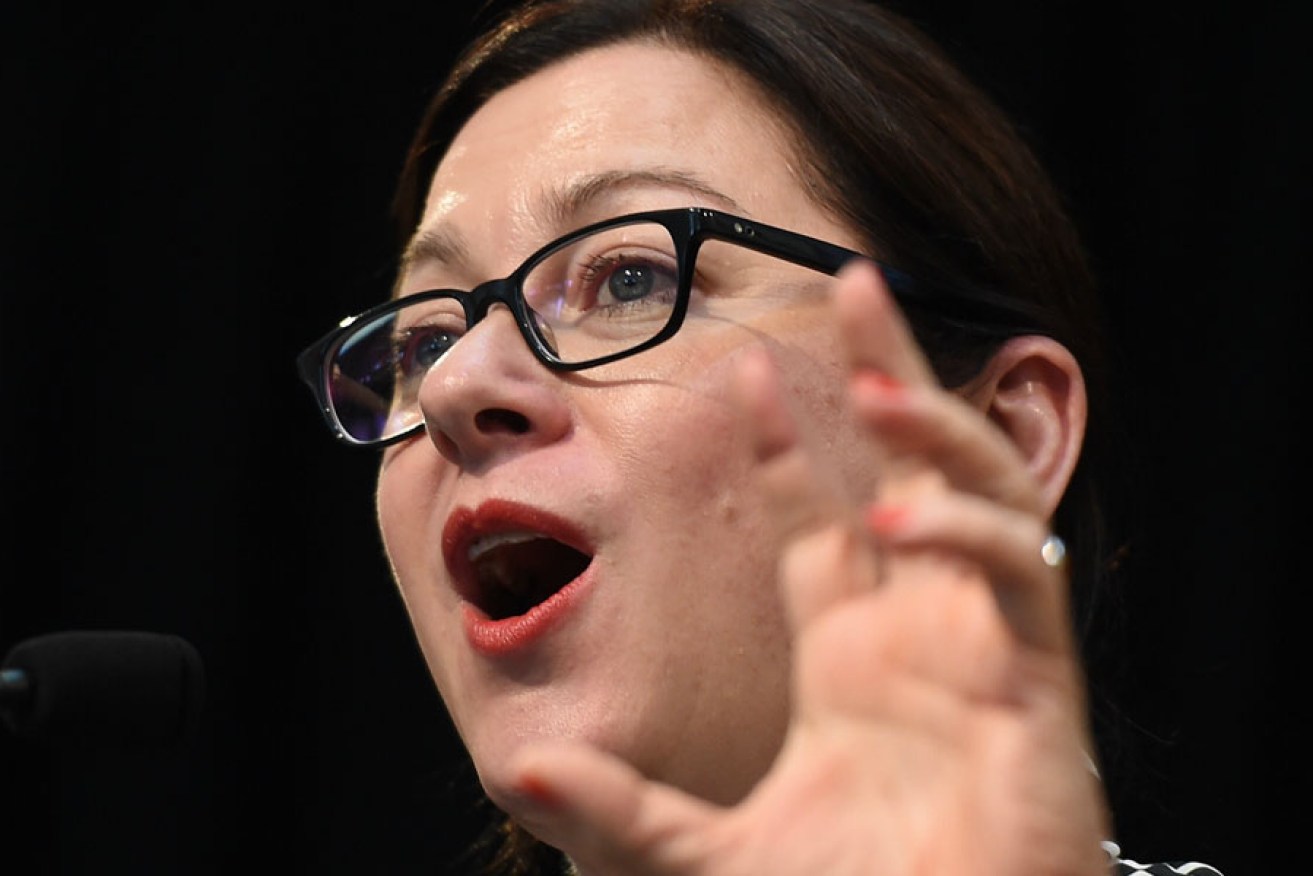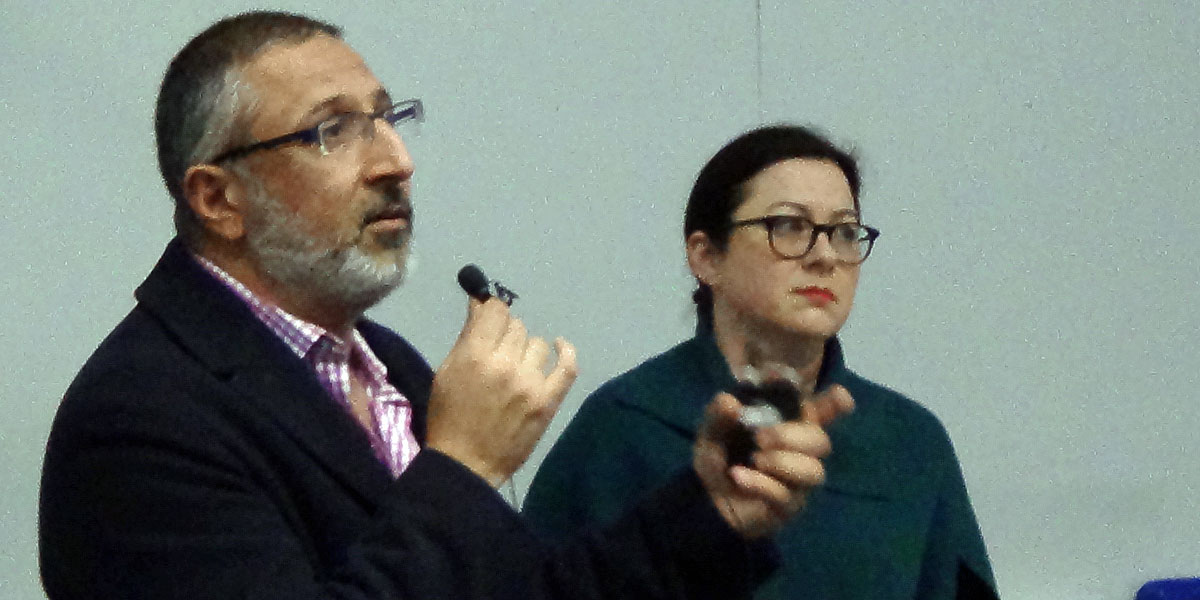Gill Hicks speaks out against Syria bombings

Gill Hicks: "You can't bomb an ideology."
London terrorist bombing survivor and peace activist Dr Gill Hicks has spoken out against Australia joining US bombing strikes in Syria, telling an Adelaide audience that “you can’t bomb an ideology”.
Hicks, who had both legs amputated below the knees after the attack on 7 July, 2005, was responding to a question from the audience at the University of Adelaide last night after an address on the topic “From Victimhood to Forgiveness”.
Prime Minister Tony Abbott revealed this week that the US had requested that Australian aircraft be allowed to bomb Islamic State targets in Syria. Australia’s bombing campaign has so far been restricted to IS targets in Iraq.
Based in Adelaide since 2012, Hicks is South Australia’s 2015 Australian of the Year and founder of the global not-for-profit organisation M.A.D. for Peace.
She said rather than bombing an ideology Australia should be “fighting ideas with ideas”.
“If we see ourselves as the more sophisticated beings, then I would like to see us be that, and I’d like to see us lead civilization,” she said.
“If we see ourselves as the superior then I’d like to see us act that way and I think there’s a lot of ground for us to be really smart, because we’ve got history to tell us that this doesn’t work.
“So I’d like to see our leaders be really smart and make some bold moves to say, ‘Actually, we’re going to try a different way’, because we’ve got history to teach us that you can’t bomb an ideology.”
Speaking afterwards to InDaily, Dr Hicks said “action is called for” in Syria.
“I think what is happening in Syria is atrocity on a scale that for many of us is unimaginable and from a humanitarian point there absolutely needs to be intervention,” she said.
“But it’s what that intervention is that really needs to be a very sophisticated, considered presence.
“I think it’s about actually getting our heads together and saying ‘What is the best thing? What do the Syrian people need and what are we saying to the growing seduction of a message that comes out of a very destructive ideology that’s coming out of the Daish (Islamic State).”
Hicks said that Australia’s “unique blend” of people gave it an opportunity to lead the world in formulating ideas and solutions about preventing violent extremism and creating a completely integrated society.
“I think we’re just primed to be a very sophisticated nation with some very sophisticated outputs and that’s where I’d like to see us take the ground, so to speak,” she said.
“I think with any conflict we need to understand the root causes. Ideas and ideology will live on and on and on… so while we may have air strikes, those very strong, often destructive, horrific ideas can live on and grow, in fact, from the actions of an air strike.”
Hicks says to “bring balance back into the world” a “sustainable model of peace” is required… and that “takes a lot of effort”.
“We need to really look at the sustainability of peace and I’m not entirely convinced that that is about an air strike intervention,” she said.
“It’s the long-term goal that will enable us to know a sustainable peace.”
During her speech Hicks recounted the moments after a terrorist bomber killed himself and more than two dozen others in the London Underground just over 10 years ago.
“The rescuers entered a situation putting their own lives at risk to save one unknown, estimated female,” she said.
“There was humanity at work, and it didn’t matter the colour of my skin, it didn’t matter whether I was rich or poor, it certainly didn’t matter if I was male or female … and that was the moment that shaped my understanding of the world and why I knew that absolutely, peace is possible.
“They actually saved my life, my entire life, because in their actions they also taught me about unconditional love … and that is the love between strangers.”
Hicks said what happened to her was unjust, but because the perpetrator is dead “there is now no longer an exchange of justice”.
“I don’t forgive the person that’s done this to me, but I actually haven’t found it necessary to,” she said.
“I have an indifference to him. That indifference, over time, has grown into pity, and that’s perhaps the worst thing that I could bestow on this person … not retribution, not hatred or bitterness, but pity.”
She admitted feeling “angrier and angrier” as time goes on, especially now that she is the “very proud mother” of a toddler.
“Never before has the loss of my legs really been quite prevalent, and growing so, when I have a very active toddler who’s able to run away from me… and I can’t get her,” she said.
“So that unjust situation smacks me in the face again, and again, and again, and again.”
Hicks, whose peace activism now includes sharing her story with Islamic youth, said her lesson to the world is how to “turn that anger into a positive motivation”.
“That anger is the thing that keeps me getting up to say: ‘What am I making a difference in today? How am I being an advocate for peace today?’, because I’m angry and I want peace to be here,” she said.
“I don’t want another person to be going through what I’m going through, anywhere in the world.”
Last night’s lectures were the last in a series of eight evenings in a peace-building colloquium entitled “Can Enemies Become Friends? From Conflict to Peace-Building”, presented by the University of Adelaide, the SA Branch of the Australian Institute of International Affairs and the Adelaide-based Abraham Institute.
The Abraham Institute began in 2003 as Project Abraham, an initiative of the Jewish Community Council of SA and the Adelaide Muslim community to create a model for peace and reconciliation between the two groups. In 2005 it was joined by Christians, also an Abrahamic faith, from the South Australian Council of Churches. It has since expanded to include all world religions.
Dr Waleed Alkhazrajy, the President of the Islamic Society of South Australia, addressed the audience about humanity’s propensity to take revenge instead of offering forgiveness.
Citing the work of the University of Miami’s Michael McCulloch on evolution and human behaviour, Alkhazrajy said that revenge has most often been humanity’s default response to threats throughout its evolution.
He illustrated this thesis with reflections on his early life in Iraq, in which he experienced war against neighbouring Iran from 1980-88 and the Gulf War of 1990-91.
In that conflict “the whole world poured every powerful weapon that mankind would know other than the atomic bomb onto our heads in Baghdad and I had to flee the city and go to a rural area,” he said.
Eventually he felt that he two options: either to leave Iraq completely or to join the opposition and take revenge.
“I was a victim of the regime, but I was a victim of someone else as well… the ones that bombarded me… and I had nothing to do with it,” he said.
Alkhazrajy took the first option, left Iraq and arrived in Australia in 1996. He now works as an anaesthetist and as a peace advocate, both within the local Islamic community and internationally on social media.
Like Hicks, Alkhazrajy believes that Australia should not participate in Syrian air strikes because it will foster more revenge.
“Do we need to be involved in Syria? Yes… (but) bombing will get victims and victims will come with revenge to you,” he said.
“What if the laser bombs fail and go onto another neighbourhood and there will be 10 people dead.
“Are they victims or are they just collateral damage? They are not collateral damage, I’m sorry.”
Alkhazrajy said instead of getting further involved in violence Australia should be trying to stop it by finding out who is arming the terrorists and applying international pressure to put a stop to it.
“The rebels, terrorists, they do not have the factory to make bombs and make bullets,” he said.
“Someone is giving it to them… let’s stop giving them the weapons and stop playing with people’s lives.”
Alkhazrajy said the conflict involving Islamic State was a centuries-old dispute and “having bombs from Australia is not going to make it less or more”.
In Iraq, “Islamic State is a Sunni faction in a Holy War against the Shi’ite Government… there is no other description for it,” he said.
“The same for Syria… Islamic State is against the Shi’ite-led Government. It’s a sectarian Holy War… it is revenge because these people are killing each other for 1400 years.
“They are still disputing who was meant to be the leader at the time; they are still killing each other. They never stop.”





